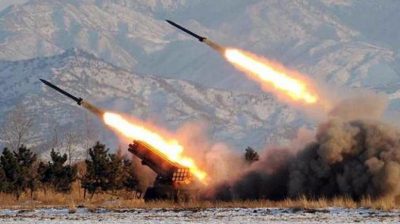US to Blame for North Korea’s Nuclear and Ballistic Missile Programs

VISIT MY NEW WEB SITE: stephenlendman.org (Home – Stephen Lendman). Contact at [email protected].
Longstanding US hostility toward the DPRK poses a serious threat to its security – its leadership acting rationally to defend itself against feared US aggression.
Failure to develop the strongest possible deterrent would be irresponsible. The menace America poses forced North Korea to prepare for the worst.
The lesson of defenseless nations victimized by US aggression is not lost on its government and military officials.
The root of the problem on the Korean peninsula lies in Washington, not Pyongyang.
“The nature of the North Korea nuclear problem is a security issue. The core of it is the conflict between the US and North Korea,” China’s Foreign Ministry spokeswoman Hua Chunying explained, adding:
“The cause of escalating tensions is not China, and the key to the problem is also not China. Parties…directly involved should do their duty and, any attempts to push away the problem is irresponsible.”
Beijing already made great sacrifices by agreeing to harsh sanctions on Pyongyang, Hua stressed. Her comments indicate China’s unlikelihood to permit further Security Council sanctions on the country.
Knowing they’re counterproductive, making things worse, not better, why didn’t China and Russia put a stop to them by vetoing the latest US draft Security Council resolution and earlier ones, heightening, not easing tensions, forcing the DPRK to continue developing its nuclear and ballistic missile deterrents, its only option given the major threat it faces.
According to Korean affairs expert Cai Jian,
“North Korea will not stop developing nuclear weapons because of the sanctions, as the regime now sees greater importance in increasing its bargaining power before any negotiations take place.”
“The firing of a second missile over Japan basically shows that North Korea could hit Guam, which it has threatened to do. So I still think it is not an option for the US to start a war when it seems North Korea’s nuclear weapons are more developed than expected. Both sides will have to sit down somehow.”
Stepping back from the brink on the Korean peninsula and avoiding possible war is only possible through diplomacy, an option Washington rejects, wanting endless political and economic war on Pyongyang to continue, threatening hostilities, risking possible conflict by accident or design.
After decades of an uneasy armistice, successive US administrations from Truman to Trump, refusing to formally end the 1950s war with a peace treaty, their unwillingness to respect North Korea’s sovereign independence, and today’s menacing US posture toward the country makes resolving things no simple task no matter what happens going forward.
Time and again, Washington showed it’s untrustworthy, lacking good faith, breaching deals made, North Korea and other countries leery of negotiating with a duplicitous partner.
The deplorable way America treats Iran shows what other independent countries are up against.
Aggressive wars Washington is waging against nonbelligerent states reveal the real threat North Korea faces, the same one Tehran faced for years.
Russia’s lower house State Duma Foreign Affairs Committee chairman Leonid Slutsky called Pyongyang’s latest missile test, three days after newly imposed sanctions, “a clear challenge for the global community.”
The launch “proves the uselessness of sanctions and pressure,” what Vladimir Putin and Xi Jinping stress while opposing the DPRK’s nuclear and ballistic missile programs because they heighten regional tensions and risk possible war.
“There is a need to search for a diplomatic solution to the North Korea issue rather than hold military drills near North Korea’s borders, threatening to conduct preventive strikes and reciprocal missile launches,” Slutsky stressed.
The obvious need is unacceptable to Washington.
“(T)alking is not the answer,” Trump roared.
“Political prostitute” Nikki Haley called the Sino/Russian double-freeze proposal “insulting.” Dealing with a belligerent nation like America to resolve major issues diplomatically is near-impossible.
Its favored strategy is endless wars of aggression. It could smash North Korea harder than earlier if it wishes. The major difference between now and then is the DPRK can hit back hard – against US regional forces, South Korea and Japan.
War on the peninsula would threaten millions of people. If waged with nuclear weapons, millions could perish.
China and Russia could be forced to intervene because of the threat to their security.
The worst case scenario is unlikely but risky enough to go all-out to prevent. Large-scale conflicts begin incrementally, the way WW I and II developed.
America wasn’t involved in the first world war until more than two-and-a-half years after it began (April 1917) – over two years after Hitler attacked Poland in September 1939.
Tens of millions of people perished in both conflicts. How many regional lives would be lost if Washington dares attack North Korea, especially if nuclear war erupts?
VISIT MY NEW WEB SITE: stephenlendman.org (Home – Stephen Lendman). Contact at [email protected].
My newest book as editor and contributor is titled “Flashpoint in Ukraine: How the US Drive for Hegemony Risks WW III.”
http://www.claritypress.com/LendmanIII.html
Listen to cutting-edge discussions with distinguished guests on the Progressive Radio News Hour on the Progressive Radio Network.

